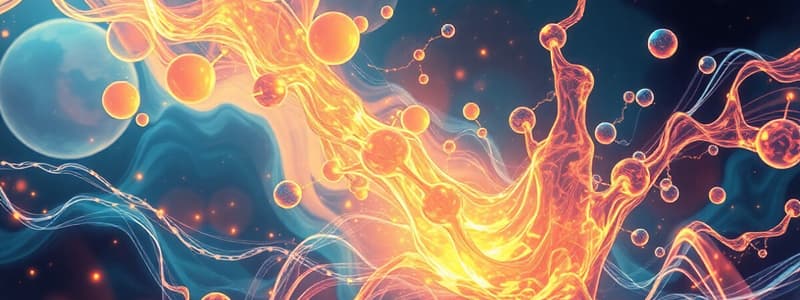Podcast
Questions and Answers
What does the First Law of Thermodynamics state?
What does the First Law of Thermodynamics state?
- Absolute zero can be reached.
- Energy can be created but not destroyed.
- Entropy of an isolated system decreases.
- Energy cannot be created or destroyed. (correct)
Which factor does NOT affect the rate of a chemical reaction?
Which factor does NOT affect the rate of a chemical reaction?
- Temperature of the reaction
- Color of the reactants (correct)
- Surface area of reactants
- Concentration of reactants
What is the significance of Le Chatelier's Principle in chemical equilibrium?
What is the significance of Le Chatelier's Principle in chemical equilibrium?
- It states that energy can be created in chemical reactions.
- It describes how changes in conditions can shift the position of equilibrium. (correct)
- It indicates that equilibrium can be reached by increasing temperature only.
- It illustrates that reactions will always favor the formation of products.
Which of the following is a colligative property?
Which of the following is a colligative property?
What do galvanic cells do?
What do galvanic cells do?
What does the Schrödinger equation describe?
What does the Schrödinger equation describe?
Which type of spectroscopy involves the measurement of nuclear magnetic fields?
Which type of spectroscopy involves the measurement of nuclear magnetic fields?
Statistical mechanics connects which of the following areas?
Statistical mechanics connects which of the following areas?
Flashcards are hidden until you start studying
Study Notes
Physical Chemistry
-
Definition: Branch of chemistry that deals with the study of how matter behaves on a molecular and atomic level, and how chemical reactions occur.
-
Key Concepts:
- Thermodynamics: Study of energy changes during chemical reactions.
- Laws of Thermodynamics:
- Energy cannot be created or destroyed (First Law).
- Entropy of an isolated system always increases (Second Law).
- Absolute zero cannot be reached (Third Law).
- Laws of Thermodynamics:
- Kinetics: Study of the rates of chemical reactions.
- Factors affecting reaction rates: concentration, temperature, surface area, and catalysts.
- Rate laws and reaction mechanisms.
- Equilibrium: Dynamic state where the rates of the forward and reverse reactions are equal.
- Le Chatelier's Principle: Changes in concentration, temperature, or pressure can shift equilibrium.
- Thermodynamics: Study of energy changes during chemical reactions.
-
States of Matter:
- Solid, liquid, gas, and plasma.
- Phase diagrams: Visual representation of states of matter under different temperature and pressure conditions.
-
Colligative Properties: Properties depending on the number of solute particles.
- Vapor pressure lowering
- Boiling point elevation
- Freezing point depression
- Osmotic pressure
-
Electrochemistry: Study of chemical processes that cause electrons to move.
- Redox reactions: Involves oxidation and reduction processes.
- Galvanic cells: Convert chemical energy to electrical energy.
- Electrolytic cells: Use electrical energy to drive chemical reactions.
-
Quantum Chemistry: Application of quantum mechanics to chemical systems.
- Wave-particle duality of electrons.
- Schrödinger equation: Fundamental equation describing how quantum states evolve.
-
Spectroscopy: Technique for analyzing the interaction between matter and electromagnetic radiation.
- Types include UV-Vis, IR, NMR, and mass spectrometry.
-
Statistical Mechanics: Connects macroscopic properties with microscopic behavior by using statistics and probability.
-
Applications:
- Understanding reaction mechanisms and pathways.
- Designing new materials and pharmaceuticals.
- Analyzing energy efficiency and conversion methods.
Studying That Suits You
Use AI to generate personalized quizzes and flashcards to suit your learning preferences.




